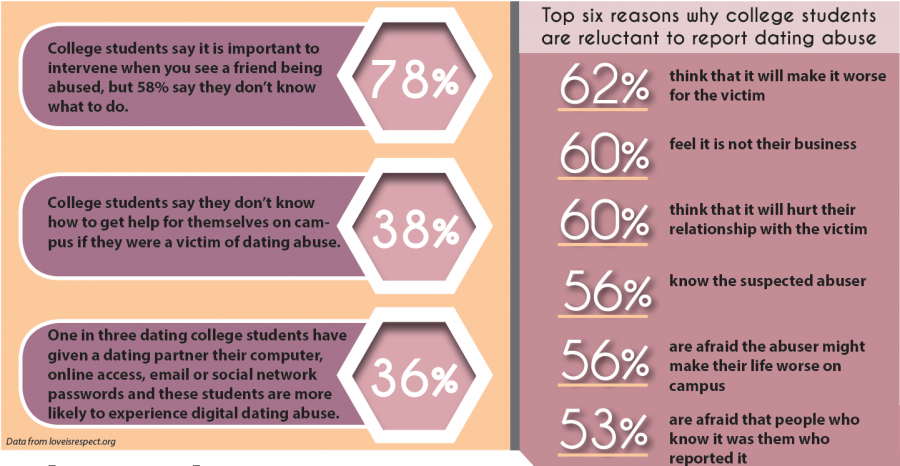Washburn takes part in Dating Violence Awareness Month
January 29, 2018
February is Dating Violence Awareness Month, a time to talk about consent, care, communication and what it means to engage in healthy relationships.
While this month is a good time for students to look at their own dating relationships, many are not entirely sure what dating violence entails.
“Often times we think [of domestic violence] as they’re married or they’re older. When you think about dating violence, often times the criteria that classifies something as dating violence, most people don’t call it that,” said Shelley Bearman, project coordinator for sexual assault education and prevention at Washburn.
Bearman said there are many signs of dating violence, such as a partner who is overprotective and wants to always know where you are or pressures you into sharing your passwords.
“[This is] actually dating violence because it infringes on your rights as an individual person,” Bearman said.
In addition to not always being seen as signs of dating violence, Bearman said that society can sometimes glorify these actions as being romantic especially in some media portrayals.
“It’s not romantic when you don’t have a choice,” Bearman said. “It’s kind of like consent. You can’t give consent if saying ‘no’ means that you’re going to be fearful that something bad will happen to you.”
According to Bearman, a lot of it hinges on the idea that people need to recognize their own individuality. While doing things as a couple is fine, both parties need to agree to it. People also need to know that doing your own thing without your partner is okay too, and your partner needs to understand that.
While much of the research on dating violence is focused on teens, there are still staggering numbers about college students and their limited knowledge of the subject.
More than half of college students have trouble identifying dating violence and about the same amount say they don’t know how to help someone who’s dealing with it, according to information gathered by loveisrespect.org.
Bearman does offer some ideas on how to recognize dating violence and how to help someone who is the victim of dating violence. Bearman says that ultimately creating a community of care is key.
“Our actions speak to the culture we want to create,” Bearman said. “Our inaction equally speaks to the culture we want to create. If we see something and we don’t know those people, if he grabs and shakes her… we know that that’s not a healthy relationship. There are things that we can do where we’re not putting ourselves at risk.”
Bearman lists a few things one can do. One such thing is distracting or drawing the attention away from the situation, maybe having a friend announce to people a dance break to get everyone involved at a party or asking the people involved in the situation a simple question and change the subject. Another thing might be to find a friend of the victim or the perpetrator and have them intervene in the situation. The ultimate goal is to diffuse the situation and also be safe while doing it.
Molly Steffes-Herman, the campus advocate for Washburn, has some advice on helping people who witness or are affected by dating violence. She suggests that if you are on campus and you see something that you feel is wrong to find someone who has any kind of authority.
“[Faculty are] responsible for making sure that campus is safe,” Steffes-Herman said.
221,919 reported sex trafficking cases in the U.S. since 2007
33 trafficking cases reported in Kansas in 2017
4.5 million people are trapped in forced sexual exploitation
National Human Trafficking
1-888-373-7888
Washburn has many resources and services available to students, many of which are equipped to help students who are affected by dating violence.
As campus advocate, Steffes-Herman’s primary job is to support students in any way they may need it.
Steffes-Herman said that if you have a friend that you think may be dealing with a difficult situation, you can find ways to help them.
Sometimes the person might not want to talk about it. In that case, Steffes-Herman recommends being gentle and encouraging them to talk with a confidential advocate or counselor.
“It’s important to reach out to people you feel comfortable talking to,” Steffes-Herman said. “If you don’t feel like you can do that then you always have your mental health professionals and your advocates…our end game is to support someone. It’s not to get someone to leave a relationship, but to provide that unbiased, non-judgemental support.”
The key in all of this is to make sure whatever you do, you offer support to the affected person.
As Dating Violence Awareness month begins, Steffes-Herman says that there are a few things she wants people to reflect on about their relationships, no matter what stage they might be in.
“Be mindful and brainstorm what you want in a partner,” Steffes-Herman said. “Think about what your values are in a relationship and what you want in a relationship. Also don’t just think about how you want someone to treat you but be thinking about how you treat others and ways that you can be a better friend.”
This Dating Violence Awareness Month, look for opportunities to help yourself and others learn more about the importance of engaging in healthy relationships.



